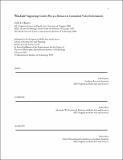WaaZam! : supporting creative play at a distance in customized video environments
Author(s)
Hunter, Seth E
DownloadFull printable version (12.04Mb)
Alternative title
Waa Zam! : supporting creative play at a distance in customized video environments
Supporting creative play at a distance in customized video environments
Other Contributors
Massachusetts Institute of Technology. Department of Architecture. Program in Media Arts and Sciences.
Advisor
Pattie Maes.
Terms of use
Metadata
Show full item recordAbstract
This thesis presents the design, implementation and evaluation of WaaZam, a telepresence system for families that supports social engagement through creative play in a unified video space. The goal of the project is to design an environment that facilitates more engaging shared experiences for geographically separated adults and children by placing them together in fantastic worlds and providing tools for them to customize the environment. Standard video mediated technologies provide a live window between remote spaces but do not support users who want to design and interact together in those virtual spaces. We outline the design an implementation of a merged telepresence environment with assets layered in 3D space. The software includes a scene maker and a scene renderer in which users can quickly design digital sets and then play in them together. It supports both physical and digital customization through gestural tools that allow users to seamlessly layer digital and physical content with their bodies. Within the environment users can also transform their appearance and record video. We present the result of pilot studies and a formal evaluation of families using WaaZam in four conditions: separate windows, magic mirror, provided fantastic sets, and self-made sets. Across these conditions we measure dramatic and narrative play patterns, mutuality, social engagement, and physical engagement. Adults and children are interviewed to determine if personalization increases the richness and depth of the user experience. A longitudinal design plan outlines a framework for how this platform could scale beyond the laboratory. We provide an outline for implementing scalable web technologies, a video protocol that supports depth and metadata, and design guidelines for installation in the homes of geographically separated families to support shared experiences.
Description
Thesis: Ph. D., Massachusetts Institute of Technology, School of Architecture and Planning, Program in Media Arts and Sciences, February 2014. Cataloged from PDF version of thesis. Includes bibliographical references (pages 141-146).
Date issued
2014Department
Program in Media Arts and Sciences (Massachusetts Institute of Technology)Publisher
Massachusetts Institute of Technology
Keywords
Architecture. Program in Media Arts and Sciences.